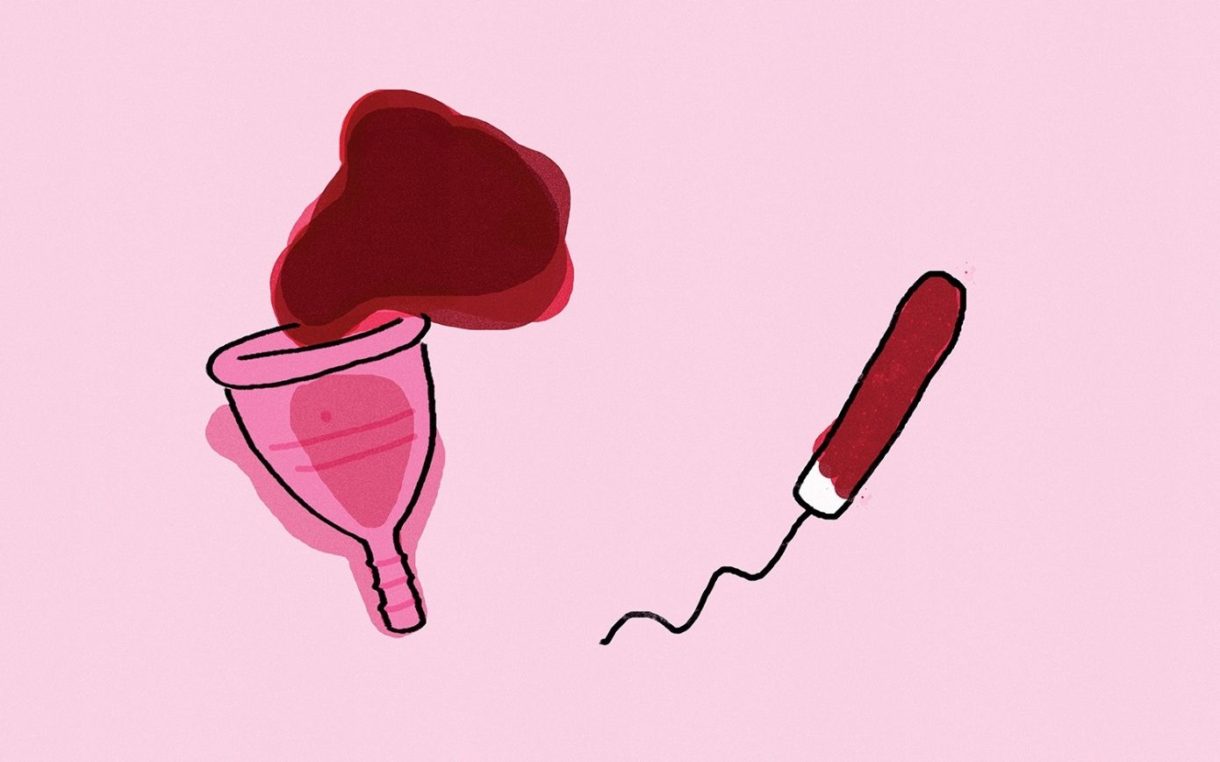Change one habit a month for a healthier planet, says Holly Hughes …
For a long time now, I have known that it’s time to find a more environmentally friendly way to cope with my period. I have known that, for one of the most natural parts of life, I have been tending to it in the most unnatural way, choosing to use plastic, stringed, winged, wrapped, and packaged products that are nefariously harming the planet as they end up in landfill and, worse again, in our waterways. It is time to reevaluate my use of disposable tampons and take stock of the effect my monthly habits are having on the planet. Having failed to take action until now, I am using this month’s column to tackle this issue and reset. Don’t switch off! This is important! What sounds odd now will soon (hopefully) become mainstream.
People with periods will menstruate for approximately four decades using, in this time, around 11,000 single-use pads or tampons. Despite the careful and clever marketing of most brands, our reliance on single-use tampons, pads, and panty liners, is neither clean nor invisible.
Quite the opposite. None of these products are recyclable and will take anywhere between 500-800 years to decompose, leaching pollutants and microplastics into our earth and oceans. Packaging alone creates almost 400 pounds of waste in one person’s lifetime. To truly underscore the ubiquity of this problem, let’s remember that globally there are 1.8 billion people dealing with menstruation every month. In addition, one in four women experience incontinence that requires similar products to manage, while postpartum periods for new mothers also necessitate using disposable absorbent items.
Made from a mixture of cotton and plastic materials – cotton often being unethically sourced and requiring huge amounts of water to produce and plastic being, well, plastic – pads are not only energy-intensive in production, they are harmful in disposal. From the used item to its flimsy plastic packaging, every discarded pad creates hundreds of years of toxic plastic waste.
Tampons are no better. This seemingly inconsequential item we use for four hours is actually something of a plastic monstrosity – one tampon contains as much plastic as four plastic shopping bags. That means that I – chief scorner of plastic shopping bags – am unwittingly using 80 plastic bags a month … and putting them inside my body!
Enough fear-mongering, let’s talk solutions. Whether it’s for menstruation, postpartum bleeding, or incontinence, there are several replacement pad options that will ensure maximum comfort and security, with minimal environmental destruction.
Firstly, you have the option of reusable pads. These operate similar to disposable pads – attaching to the lining of your underwear and coming in a variety of absorbencies – the only difference being you wash them rather than throw them away after using. Widely available in any number of shops around Ireland, reusable pads often come in pretty patterns that make a period more of a gingham delight than an embarrassing chore.
Whether it’s for menstruation, postpartum bleeding, or incontinence, there are several replacement pad options that will ensure maximum comfort and security, with minimal environmental destruction.
Another option is period underwear. This kind of underwear removes the need for regular pad or tampon replacement (the bane of my life) and instead offers an easy, leak-free option for day or night-time with its various layers of absorbent fabric. The long lifespan of period underwear makes them a sustainable, eco-friendly and, just as crucially, affordable option for anyone menstruating. I love that they can be worn as a precaution or safety measure without any discomfort or obviousness and so are a perfect option for anyone suffering with incontinence.
One thing to note when choosing your underwear or reusable pads is the material they are made from. Most period underwear is made from cotton and synthetics such as nylon, polyester or polyamide. These materials carry harmful environmental impacts both in their production and disposal processes. While I still think the amount of pollutant waste this underwear saves make them significantly better than any other disposable option, it is good to be mindful of fabric choices, ethical certifications, and even use of dyes that might pose toxic issues in disposal.
One brand available around Ireland that I’m particularly enamoured with is WUKA. In their extensive range of carbon neutral underwear – which offers everything from boyfriend shorts to thong styles – they use only organic cotton, Tencel (a fabric made from sustainable beech trees) and recycled nylon. As is too rarely the case for ethical clothing, WUKA is crucially size inclusive, stocking sizes 6-26.
For tampon lovers like myself, there are two options. The first is the menstrual cup which seems to garner a love/hate response among users. Lasting up to ten years if cared for properly, menstrual cups save 2,400 pads or tampons and are estimated to have less than two per cent of the environmental impact of disposable options. While it might take a couple of tries to find the right cup for you and get used to this new product, I highly encourage you to seek out menstrual cups in any number of online or local stores for an affordable, sustainable, and immensely waste-saving option.
Finally, if you can’t quite give up on the idea of disposable tampons (trust me, I get it!) you can opt for compostable tampons or pads made from 100 per cent organic cotton or natural bamboo. Investing in a reusable tampon applicator or learning to go without an applicator at all are other simple ways to remove plastic from your monthly cycle.
To have these delivered to your door so you’re never caught on the proverbial hop again, I recommend West Cork-based company Riley. This local Irish business is a gamechanger for lovers of disposable period products that still want to ensure minimal environmental damage. Their tampons and pads are made from 100 per cent certified organic cotton and using only natural, compostable adhesives so they are free from toxins, bleach, and chemicals. Equally important, their products are manufactured within the EU for a lower carbon footprint and are produced to ethical standards of wage and working conditions. Did I mention they’re from West Cork?
As ever, you don’t need to go cold turkey on the habits of a lifetime. Even buying one pair of period underwear to supplement your pad or tampon use, or trialling a menstrual cup on your heavier days, can still make a seismic impact in reducing your period waste. The point, as always, is just to try. @holly_hughes_words
LOVETHEGLOSS.IE?
Sign up to our MAILING LIST now for a roundup of the latest fashion, beauty, interiors and entertaining news from THE GLOSS MAGAZINE’s daily dispatches.





